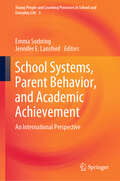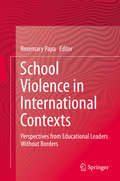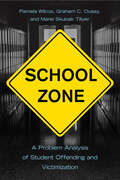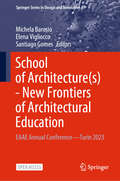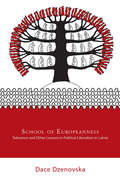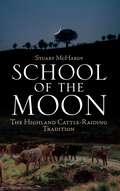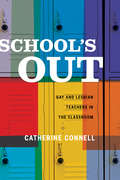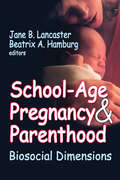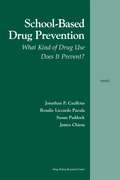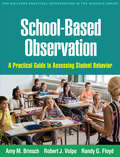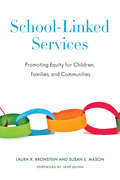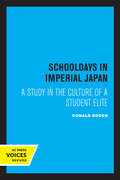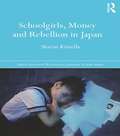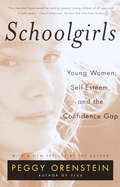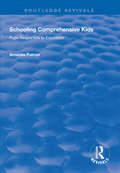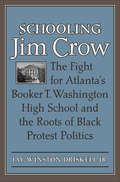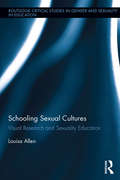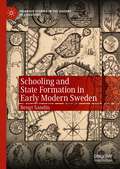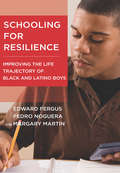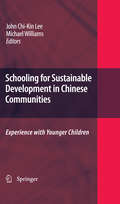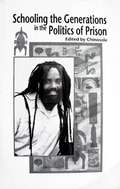- Table View
- List View
School Songs and Gym Slips: Grammar Schools in the 1950s and 1960s
by Marilyn YurdanWhat was life really like in a grammar school in the 1950s and ’60s? For those educated at a grammar school during their heyday, this time holds very special memories. They were more than just the years of being taught Latin and domestic science, custard and semolina school dinners, and learning about the birds and the bees; they were the formative years of a generation, when those from all walks of life were given a uniform, a code of behaviour and, most importantly, pride in the institution to which they belonged. This generation of Baby Boomers holds a unique place in British history: growing up during the years when the country was emerging from the shadow cast by the Second World War, they were the first youngsters to benefit from the ‘mod cons’ and innovations which were gradually being introduced. With fascinating memories and details that will resonate with thousands of grammar school pupils across the country, School Songs and Gymslips is a heart-warming collection of the experiences of the author and her contemporaries during a golden era.
School Supports for Students in Military Families (The Guilford Practical Intervention in the Schools Series)
by Pamela FenningHow does growing up in a military family affect the educational experiences of children and youth? What can K–12 school practitioners do to support these students' academic, behavioral, and social-emotional success? This book describes effective ways to help students and their families navigate such challenges as relocation, school transitions, and parental deployment. Pamela Fenning presents strengths-based assessment, intervention, and prevention strategies that reflect deep knowledge of military culture and fit perfectly within a schoolwide multi-tiered system of support (MTSS). In a convenient large-size format, the book includes a reproducible data collection form that can be downloaded and printed for repeated use. This book is in The Guilford Practical Intervention in the Schools Series, edited by Sandra M. Chafouleas.
School Systems, Parent Behavior, and Academic Achievement: An International Perspective (Young People and Learning Processes in School and Everyday Life #3)
by Emma Sorbring Jennifer E. LansfordThis volume takes an international and multidisciplinary approach to understanding students’ academic achievement. It does so by integrating educational literature with developmental psychology and family studies perspectives. Each of the nine chapters focuses on a particular country: China, Colombia, Italy, Jordan, Kenya, the Philippines, Sweden, Thailand, or the United States. It describes the country as a cultural context, examines the current school system and parenting in light of the school system, and provides empirical evidence from that country regarding links between parenting and students’ academic achievement. The book highlights similarities and differences in education and parenting across these nine countries - all varying widely in socioeconomic and cultural factors that affect schools and families. The volume contributes to greater understanding of links between parenting and academic performance in different cultural groups. It sheds light on how school systems and parenting are embedded in larger cultural settings that have implications for students’ educational experiences and academic achievement. As two of the most important contexts in which children and adolescents spend time, understanding how schools and families jointly contribute to academic achievement holds promise for advancing the international agenda of promoting quality education for all.
School Violence in International Contexts: Perspectives from Educational Leaders Without Borders
by Rosemary PapaThis international edited volume is a rare look at cultural, economic and political forces that contribute to school violence. In light of the devastating events in US schools and the violence towards students and schools world-wide, the war on knowledge development in non/secular education is increasing at an alarming rate. This book offers an international perspective on violence from both K-12 to tertiary levels, parents, administrators-teachers-support staff and research scholars in a desire to understand the contextual issues surrounding violence and its impacts on the field of education. ELWB Scholars and practitioners hail from six continents propose historical to futuristic perspectives linking violence towards education and its inhabitants while framing future strategies to alter multinational fear mongering to the decline of knowledge generation for an informed citizenry.
School Zone: A Problem Analysis of Student Offending and Victimization
by Pamela Wilcox Graham C. Ousey Marie Skubak TillyerSchools should be safe—but they are not always safe for everybody. Authors Pamela Wilcox, Graham Ousey, and Marie Skubak Tillyer studied crime among students located across diverse middle- and high-school settings to investigate why some students engage in delinquency—but others do not—and why some students are more prone to victimization. School Zone focuses on the three key interactional elements—context, victims, and offenders—to understand and explain the impact of common crimes such as theft, weapon carrying, drug possession and the verbal, physical, and sexual harassment of classmates. The authors also consider how individual students and schools respond to crime and threats. They analyze the variables that schools can control in planning and practice that explain why some schools have higher crime rates. School Zone uses empirical studies to provide a comprehensive understanding of the patterns and causes of variation in individual- and aggregate-level school-based offending and victimization experiences while also addressing the adequacy of wide-ranging criminological explanations and crime prevention policies. In their conclusion, the authors assess the extent to which currently popular strategies of school crime prevention align with what they have discovered through their problem-analysis framework and scientific understandings of student offending and victimization.
School of Architecture: EAAE Annual Conference—Turin 2023 (Springer Series in Design and Innovation #47)
by Michela Barosio Santiago Gomes Elena ViglioccoThis open access book gathers the latest advances and innovations in the field of architectural education, as presented at the 2023 annual conference of the European Association for Architectural Education (EAAE AC), “School of Architecture(s)”, held in Turin, Italy, on August 30–September 1, 2023.
School of Dreams: Making the Grade at a Top American High School
by Edward HumesWhat is the price of an education at a top public high school?Whitney High delivers everything we ask of a school: a love of learning, a sense of mission, and SAT scores to die for. But there are unintended consequences to attending the school of our dreams, as author Edward Humes found during his year inside this world of high achievement and high pressure.Students work nearly around the clock, building futures to please parents as much as themselves. Their drug of choice? Caffeine. Their goal? Getting into a top college. Their biggest fear? Not living up to their families' stratospheric expectations. But what these kids have going for them is the extraordinary community within Whitney High-- a school with doors open seven days a week, where teachers love teaching and the students linger long after the school day ends.
School of Europeanness: Tolerance and Other Lessons in Political Liberalism in Latvia
by Dace DzenovskaIn School of Europeanness, Dace Dzenovska argues that Europe’s political landscape is shaped by a fundamental tension between the need to exclude and the requirement to profess and institutionalize the value of inclusion. Nowhere, Dzenovska writes, is this tension more glaring than in the former Soviet Republics.Using Latvia as a representative case, School of Europeanness is a historical ethnography of the tolerance work undertaken in that country as part of postsocialist democratization efforts. Dzenovska contends that the collapse of socialism and the resurgence of Latvian nationalism gave this Europe-wide logic new life, simultaneously reproducing and challenging it. Her work makes explicit what is only implied in the 1977 Kraftwerk song, "Europe Endless": hierarchies prevail in European public and political life even as tolerance is touted by politicians and pundits as one of Europe’s chief virtues.School of Europeanness shows how post–Cold War liberalization projects in Latvia contributed to the current crisis of political liberalism in Europe, providing deep ethnographic analysis of the power relations in Latvia and the rest of Europe, and identifying the tension between exclusive polities and inclusive values as foundational of Europe’s political landscape.
School of the Moon: The Highland Cattle-Raiding Tradition
by Stuart McHardyThe real story of the last years of the ancient Celtic-speaking warrior society that had survived in the Scottish Highlands from time immemorial. Behind the tales of cateran raiding in the Scottish Highlands was an age-old practice, beloved of the clan warriors. Trained in the ways of the School of the Moon they liked little better than raiding other clans to lift their cattle and disappear into the wild mountains under the cover of darkness. If pursued and battle became necessary, that was no problem to the clansmen. This traditional practice of the Scottish Highland warriors, originating at least as far back as the Iron Age, has left us many grand stories, apocryphal and historical. Through investigating these stories Stuart McHardy came across material, some of it as yet unpublished, which leads to a startling new interpretation of what was going on in the Scottish Highlands in the years after Culloden. The British government called it cattle thieving but the men who returned to the ways of the School of the Moon were the last Jacobites, fighting on in a doomed guerrilla campaign against an army that had a garrison in every glen and town in Scotland.
School's Out: Gay and Lesbian Teachers in the Classroom
by Catherine ConnellHow do gay and lesbian teachers negotiate their professional and sexual identities at work, given that these identities are constructed as mutually exclusive, even as mutually opposed? Using interviews and other ethnographic materials from Texas and California, School's Out explores how teachers struggle to create a classroom persona that balances who they are and what's expected of them in a climate of pervasive homophobia. Catherine Connell's examination of the tension between the rhetoric of gay pride and the professional ethic of discretion insightfully connects and considers complicating factors, from local law and politics to gender privilege. She also describes how racialized discourses of homophobia thwart challenges to sexual injustices in schools. Written with ethnographic verve, School's Out is essential reading for specialists and students of queer studies, gender studies, and educational politics.
School-Age Pregnancy and Parenthood: Biosocial Dimensions
by Beatrix A. HamburgThis important work examines in detail and depth how, as a consequence of changing technologies, diet, patterns of reproduction, and work, relations between children and parents have altered.The editors and contributors hold that biosocial science is particularly relevant to research on human family systems and parenting behavior. The family is the universal social institution in which the care of children is based and the turf where cultural tradition, beliefs, and values are transmitted to the young as they fulfill their biological potential for growth, development and reproduction. The biosocial perspective takes into account the biological substratum and the social environment as critical co-determinants of behavior and pinpoints areas in which contemporary human parental behavior exhibits continuities with and departures from, patterns evident throughout history.This work crosses disciplinary lines without ignoring their relevance to the broader themes of the book. School age pregnancy and parenthood is a powerful anchor for the dissection of large scale issues. The contributors deal in turn with ethnic and historical experience, examine normative and ethical issues, and cast new light on methodological concerns. What the editors call culturally-defined responses to basic needs helps explain both dramatic improvements in this area, and how they expand the challenge of teen reproduction. Contributors emphasize new demands for training and education to research this growing phenomenon. The book contributes to humane concerns as well as the scientific imagination.
School-Based Drug Prevention
by James Chiesa Rosalie Liccardo Pacula Jonathan P. Caulkins Susan M. PaddockSchool-based drug prevention, popular with the public and politicians alike, is now a nearly universal experience for American youth. Analysis has shown that the best programs can reduce use of a wide range of substances. But questions remain regarding how to think about and, hence, fund, these programs. Should they be viewed principally as weapons in the war against illicit drugs, or, at the other extreme, do prevention programs benefit students and society most by reducing use of alcohol and tobacco? The authors address these questions by comparing for the first time the social benefits of school-based prevention programs' long-run impacts on a diverse set of different substances.
School-Based Observation: A Practical Guide to Assessing Student Behavior
by Amy M. Briesch Robert J. Volpe Randy G. FloydWidely used to assess social–emotional and behavioral referral concerns in grades PreK–12, systematic direct observation is an essential skill for school psychologists and other educators. This accessible book helps practitioners conduct reliable, accurate observations using the best available tools. Chapters present effective coding systems for assessing student classroom behavior, the classroom environment, behavior in non-classroom settings, and behavior in a functional assessment context; also provided are guidelines for developing new codes when an appropriate one does not already exist. Procedures for summarizing, graphing, and interpreting data for different assessment purposes are detailed. In a large-size format with lay-flat binding for easy photocopying, the book includes 13 reproducible coding forms. Purchasers get access to a Web page where they can download and print the reproducible materials. This book is in The Guilford Practical Intervention in the Schools Series, edited by T. Chris Riley-Tillman.
School-Linked Services: Promoting Equity for Children, Families, and Communities
by Laura Bronstein Susan MasonThe evidence-based strategies in this volume close the achievement gap among students from all sociological backgrounds. Designed according to local needs assessments, they provide the services, programs, initiatives, and relationships that are crucial for children's success in school and life.These practices and programs include afterschool and summer sessions, early-childhood education, school-linked health and mental health services, family engagement, and youth leadership opportunities. This book addresses the policy and funding requirements that help these partnerships thrive and offers effective counterarguments against those who would question their value. The text describes strategies that work in both rural and urban contexts and includes a chapter evaluating school-community partnerships across the world. Because it involves collaborations across professions and organizations, the book's interdisciplinary approach will appeal to those in social work, education, psychology, public health, counseling, nursing, and public policy.
Schooldays in Imperial Japan: A Study in the Culture of a Student Elite
by Donald T. RodenThis title is part of UC Press's Voices Revived program, which commemorates University of California Press’s mission to seek out and cultivate the brightest minds and give them voice, reach, and impact. Drawing on a backlist dating to 1893, Voices Revived makes high-quality, peer-reviewed scholarship accessible once again using print-on-demand technology. This title was originally published in 1980.
Schoolgirls, Money and Rebellion in Japan (Nissan Institute/Routledge Japanese Studies)
by Sharon KinsellaJapanese society in the 1990s and 2000s produced a range of complicated material about sexualized schoolgirls, and few topics have caught the imagination of western observers so powerfully. While young Japanese girls had previously been portrayed as demure and obedient, in training to become the obedient wife and prudent mother, in recent years less than demure young women have become central to urban mythology and the content of culture. The cultic fascination with the figure of a deviant school girl, which has some of its earliest roots in the nineteenth and early twentieth centuries, likewise re-emerged and proliferated in fascinating and timely ways in the 1990s and 2000s. Through exploring the history and politics underlying the cult of girls in contemporary Japanese media and culture, this book presents a striking picture of contemporary Japanese society from the 1990s to the start of the 2010s. At its core is an in-depth case study of the media delight and panic surrounding delinquent prostitute schoolgirls. Sharon Kinsella traces this social panic back to male anxieties relating to gender equality and female emancipation in Japan. In each chapter in turn, the book reveals the conflicted, nostalgic, pornographic, and at times distinctly racialized manner, in which largely male sentiments about this transformation of gender relations have been expressed. The book simultaneously explores the stylistic and flamboyant manner in which young women have reacted to the weight of an obsessive and accusatory male media gaze. Covering the often controversial subjects of compensated dating (enjo kôsai), the role of porn and lifestyle magazines, the historical sources and politicized social meanings of the schoolgirl, and the racialization of fashionable girls, Schoolgirls, Money, Rebellion in Japan will be invaluable to students and scholars of Japanese culture and society, sociology, anthropology, gender and women's studies.
Schoolgirls: Young Women, Self Esteem, and the Confidence Gap
by Peggy OrensteinA NEW YORK TIMES NOTABLE BOOK OF THE YEAR. The classic account of the hurdles facing adolescent girls in America--now reissued with a new Foreword, to coincide with the award-winning author's new book on women and identity.Inspired by a study by the American Association of University Women that showed girls' self-esteem plummeting as they reach adolescence, Peggy Orenstein spent months observing, interviewing, and getting know dozens of girls both inside and outside the classroom at two very different schools in northern California. The result was a groundbreaking book in which she brought the disturbing statistics to life with skill and flair of an experienced journalist. Orenstein plumbs the minds of both boys and girls who have learned to equate masculinity with opportunity and assertiveness, and femininity with reserve and restraint. She demonstrates the cost of this insidious lesson, by taking us into the lives of real young women who are struggling with eating disorders, sexual harassment, and declining academic achievement, especially in math and science. Peggy Orenstein's SchoolGirls is a classic that belongs on the shelf with the work of Carol Gilligan, Joan Jacobs Brumberg, and Mary Pipher. It continues to be read by all who care about how our schools and our society teach girls to shortchange themselves.
Schooling Comprehensive Kids: Pupil Responses to Education (Routledge Revivals)
by Amanda PalmerFirst published in 1998, this volume is based upon an ethnographic study of white and black in a mixed comprehensive school conducted during the 1980s and explores differentiation in the classroom, looking at gender, colour and class differences within groups of students. The findings are discussed in the light of the strong debate within the sociology of education that took place during the 1970s and 1980s concerning academic achievement and underachievement. Amanda Palmer reveals, in contribution to this debate, that class origins played a primary role in the formation of pupils’ attitudes towards school and that class, race and gender were involved in how teachers reacted to pupils
Schooling Jim Crow: The Fight for Atlanta's Booker T. Washington High School and the Roots of Black Protest Politics (Carter G. Woodson Institute Series)
by Jay Winston Driskell Jr.In 1919 the NAACP organized a voting bloc powerful enough to compel the city of Atlanta to budget $1.5 million for the construction of schools for black students. This victory would have been remarkable in any era, but in the context of the Jim Crow South it was revolutionary. Schooling Jim Crow tells the story of this little-known campaign, which happened less than thirteen years after the Atlanta race riot of 1906 and just weeks before a wave of anti-black violence swept the nation in the summer after the end of World War I. Despite the constant threat of violence, Atlanta's black voters were able to force the city to build five black grammar schools and Booker T. Washington High School, the city's first publicly funded black high school. Schooling Jim Crow reveals how they did it and why it matters.In this pathbreaking book, Jay Driskell explores the changes in black political consciousness that made the NAACP's grassroots campaign possible at a time when most black southerners could not vote, let alone demand schools. He reveals how black Atlantans transformed a reactionary politics of respectability into a militant force for change. Contributing to this militancy were understandings of class and gender transformed by decades of racially segregated urban development, the 1906 Atlanta race riot, Georgia's disfranchisement campaign of 1908, and the upheavals of World War I. On this cultural foundation, black Atlantans built a new urban black politics that would become the model for the NAACP's political strategy well into the twentieth century.
Schooling Sexual Cultures: Visual Research in Sexuality Education (Routledge Critical Studies in Gender and Sexuality in Education)
by Louisa AllenMoving beyond the traditional focus on curriculum and pedagogy, this volume explores hidden dimensions of sexuality education in schools and how sexual meanings are produced. Challenging the standard understandings of sexuality education, Allen discusses how students’ knowledge of sexualities is often learnt outside the ‘official’ school curriculum in informal spaces such as the sports field, gym locker rooms and peer groups. By employing visual methods and analysing student photo-diaries, Allen’s original book captures a sexual culture of schooling that allow readers to literally ‘see through young people’s eyes.’ Introducing theoretical ideas in relation to queer theory and ‘new’ feminist new materialisms, this volume calls for a re-conceptualization of how sexuality comes into being at school, in order to take account of its material, spatial and embodied elements.
Schooling and State Formation in Early Modern Sweden (Palgrave Studies in the History of Childhood)
by Bengt SandinIn this book the emergence of schools in urban Sweden between the seventeenth and the nineteenth century provides the framework for a history of children and of childhood. It is a study through the lens of the changes in early modern education, spatial aspect of the life of children and systems of governance in the early modern Swedish state. Educational systems defined the spatial aspects of childhood—where children were supposed to grow up, in the home, the school, the streets and alleys, or the place of work—over a period of about two hundred years. Schools and education represent both a mental and a physical space; an abstract place for children as well as a local and concrete place for them, which stood out against the alternative spatial aspects of the life of children. It is also a study of how different cultural systems influence the definitions of childhood and schools, in the context of church and home instruction, poor relief, policing, surveillance, and the question of why children went to schools. It examines the role of the school as childcare and as a provider of food, shelter and welfare, and as governance.
Schooling for Resilience: Improving the Life Trajectory of Black and Latino Boys (Youth Development and Education Series)
by Pedro Noguera Edward Fergus Margary MartinAs a group, Black and Latino boys face persistent and devastating disparities in achievement when compared to their White counterparts: they are more likely to obtain low test scores and grades, be categorized as learning disabled, be absent from honors and gifted programs, and be overrepresented among students who are suspended and expelled from school. They are also less likely to enroll in college and more likely to drop out. Put simply, they are among the most vulnerable populations in our schools.Schooling for Resilience investigates how seven newly formed schools, created specifically to serve boys of color, set out to address the broad array of academic and social problems faced by Black and Latino boys. Drawing on student and teacher surveys, focus groups, interviews, and classroom observations, the authors investigate how these schools were developed, what practices they employed, and how their students responded academically and socially. In particular, they focus on the theory of action that informed each school&’s approach to educating Black and Latino boys and explore how choices about school structure and culture shaped students&’ development and achievement. In doing so, the authors identify educational strategies that all schools can learn from. This thoughtful, passionately argued volume promises to influence efforts to improve the achievement and life outcomes of Black and Latino boys for years to come.
Schooling for Sustainable Development in Chinese Communities
by Michael Williams John Chi-Kin LeeThis book focuses on the academic foundations, trends and traditions of environmental education for sustainable development principally in Chinese contexts. It highlights contexts and case studies that illuminate recent Chinese initiatives. It includes case studies of green schools and reports on recent initiatives in school-based ESD curriculum development programmes in China, Hong Kong, Macao and Taiwan. The book concludes with an overview chapter that points to likely future developments. The assumption underpinning the book is that experiences gained in such a major country as China will be of real interest to geographical and environmental educationists, professional educators and teachers elsewhere. Not only will it generate interest and create greater awareness but also it is hoped that these experiences will provide a platform for scholarly exchange and contribute insights on education policy and curriculum changes across Asian-Pacific communities in an increasingly globalised world.
Schooling the Freed People: Teaching, Learning, and the Struggle for Black Freedom, 1861-1876
by Ronald E. ButchartConventional wisdom holds that freedmen's education was largely the work of privileged, single white northern women motivated by evangelical beliefs and abolitionism. Schooling the Freed People shatters this notion entirely. For the most comprehensive quantitative study of the origins of black education in freedom ever undertaken, Ronald E. Butchart combed the archives of all of the freedmen's aid organizations as well as the archives of every southern state to compile a vast database of over 11,600 individuals who taught in southern black schools between 1861 and 1876. Based on this path-breaking research, he reaches some surprising conclusions: one-third of the teachers were African Americans; black teachers taught longer than white teachers; half of the teachers were southerners; and even the northern teachers were more diverse than previously imagined. His evidence demonstrates that evangelicalism contributed much less than previously believed to white teachers' commitment to black students, that abolitionism was a relatively small factor in motivating the teachers, and that, on the whole, the teachers' ideas and aspirations about their work often ran counter to the aspirations of the freed people for schooling. The crowning achievement of a veteran scholar, this is the definitive book on freedmen's teachers in the South as well as an outstanding contribution to social history and our understanding of African American education.
Schooling the Generations in the Politics of Prison
by ChinosoleSchooling the Generations in the Politics of Prison


